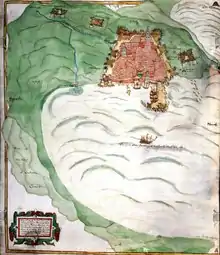English expedition to Algiers (1620–1621)
The English Expedition to Algiers occurred between 1620 and 1621, it was a naval attack ordered by King James with the goal of ending Muslim piracy.[2][1]
| English Expedition to Algiers | |||||||
|---|---|---|---|---|---|---|---|
| Part of Corsair War (1620-1621) | |||||||
 Depiction of Algiers in 1620 | |||||||
| |||||||
| Belligerents | |||||||
|
|
| ||||||
| Commanders and leaders | |||||||
| Mansell | Kassan Kaid Kussa | ||||||
| Strength | |||||||
| 20 ships | Unknown | ||||||
| Casualties and losses | |||||||
| Unknown | Unknown | ||||||
King James of England ordered a naval attack against Algiers aiming to put an end to Muslim piracy.[2][1]
Background
With the accession of James I (1603-1625) to power in England, relations moved from peaceful diplomacy to maritime aggression. As an "opponent of Islam", he damaged relations with Algiers by issuing privateer licenses to his subjects, encouraging them to confiscate Muslim ships and passengers.[4] Although the Council order of 1595 recalled privateer licenses due to British privateers committing infractions and being prosecuted and sentenced in admiralty courts, they still had "a freer command over the Mediterranean, where Turkish and Algerian ships were seen as rightful prizes.[5] In 1620, a British fleet under the command of Admiral Robert Mansell, supported by Richard Hawkins and Thomas Button, was sent to Algiers to put an end to the grips of the Barbary pirates on the trade route passing through the Strait of Gibraltar. After obtaining the release of 40 captives, following negotiations, in November 1620, Mansell took part in a second expedition in 1621.
The Battle
On 27 November in the year 1620, Mansell arrived at Algiers with 20 ships and formally demanded that the Dey of Algiers surrender all of the English subjects, all of the English vessels and he also demanded the execution or capture of all of the pirates who had taken them.[1] The Algerians pretended to show eagerness to comply with his demands and released some four-and-twenty captives. Mansell was aware that this was a small amount since the Algerians had captured 150 English vessels in the past six years, however he was not prepared to fight and sailed away.[1]
On 21 May, he returned to Algiers and three days later launched his attack.[1] The English launched their fireships against the pirate shipping, flames were seen shooting up in no less than seven places amongst the rigging.[1] The English were low on ammunition and the Algerians took advantage, the Algerians hurried back and drove of the English.[1] The failure of the English expedition was complete.[1][2][3]
Aftermath
The indiscretion of the English prompted a violent revenge by the Algerian pirates: they not only raided merchant ships in the Mediterranean, but extended their piracy to the British mainland along the English Channel, passing by Years of privateering have done England more damage than Algiers, James I furthered a Treaty through the Sublime Porte, where he negotiated directly in Constantinople in 1622 with the Pasha of Algiers, who happened to be visiting there.[6]
English ships
| Ship | Guns | Commander | Notes | Ref. |
|---|---|---|---|---|
| Lion | 40 | Admiral Sir Robert Mansell | [7] | |
| Vanguard | 40 | Vice-Admiral Sir Richard Hawkins | ||
| Rainbow | 40 | Rear-Admiral Sir Thomas Button | ||
| Constant Reformation | 40 | Captain Arthur Manwaring | [7][8] | |
| Antelope | 34 | Captain Sir Henry Palmer | [7][9] | |
| Convertine | 36 | Captain Thomas Love | [7][10] | |
| Mercury | 20 | Joined 26 February 1621 | [7] | |
| Spy | 18 | |||
| Golden Phoenix | 24 | Hired merchant ship | [11] | |
| Samuel | 22 | |||
| Marygold | 21 | |||
| Zouche Phoenix | 26 | |||
| Barbary | 18 | |||
| Centurion | 22 | |||
| Primrose | 18 | |||
| Hercules | 24 | |||
| Neptune | 21 | |||
| Bonaventure | 23 | |||
| Restore | 12 | |||
| Marmaduke | 12 |
Citations
- Prince Charles and the Spanish Marriage (1617-1623): A Chapter of English History. Samuel Rawson Gardiner. Hurst a. Blackett.
- Turks, Moors, and Englishmen in the Age of Discovery. Nabil Matar. Columbia University Press.
- The Safeguard of the Sea: A Naval History of Britain 660-1649. N A M Rodger.
- Marsden, Reginald Godfrey (1915). Documents Relating to Law and Custom of the Sea: A.D. 1205-1648. Navy Records Society. p. xxvii.
- Marsden, Reginald Godfrey (1915). Documents Relating to Law and Custom of the Sea: A.D. 1205-1648. xxiii: Navy Records Society. Retrieved 7 July 2023.
- Fatima Maameri (2008). Ottoman Algeria in Western Diplomatic History with Particular Emphasis on Relations with the United States of America, 1776-1816 (PDF). Dissertation submitted to the Faculty of Letters and Languages Department of Languages, University Mentouri, Constantine in fulfillment of the requirements for the degree of doctorat d’Etat. p. 116. Retrieved 14 June 2023.
- Winfield (2009), p. 57.
- Winfield (2009), p. 167.
- Winfield (2009), p. 218.
- Winfield (2009), p. 221.
- Winfield (2009), p. 799.
References
- Winfield, Rif (2009). British Warships in the Age of Sail 1603–1714. Barnsley, South Yorkshire: Seaforth. ISBN 978-1-78346-924-6.